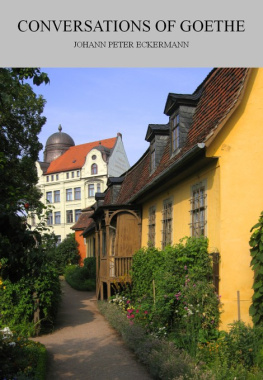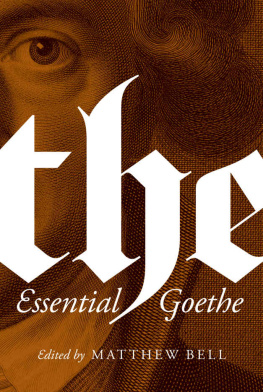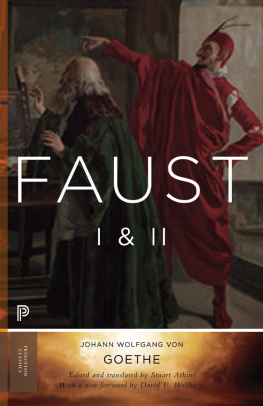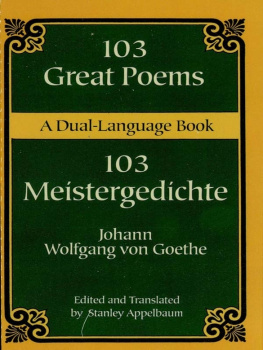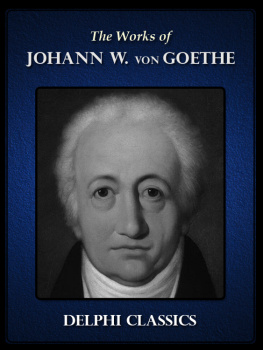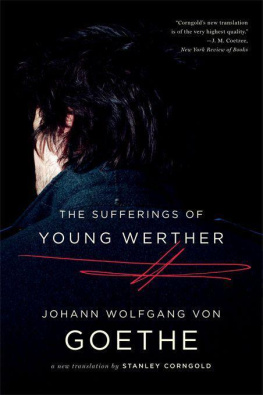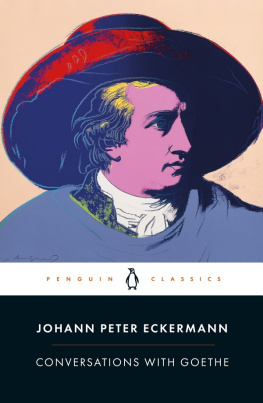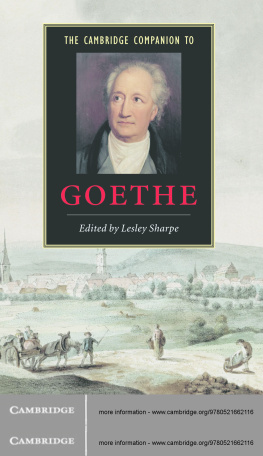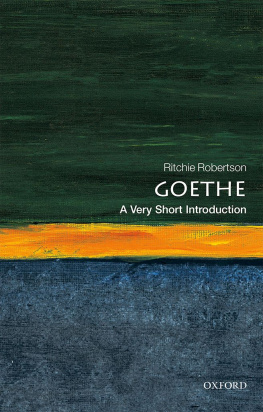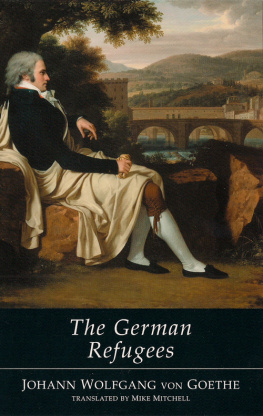Johann Wolfgang Von Goethe - Conversations of Goethe with Johann Peter Eckermann
Here you can read online Johann Wolfgang Von Goethe - Conversations of Goethe with Johann Peter Eckermann full text of the book (entire story) in english for free. Download pdf and epub, get meaning, cover and reviews about this ebook. year: 1998, publisher: Da Capo Press, genre: Science. Description of the work, (preface) as well as reviews are available. Best literature library LitArk.com created for fans of good reading and offers a wide selection of genres:
Romance novel
Science fiction
Adventure
Detective
Science
History
Home and family
Prose
Art
Politics
Computer
Non-fiction
Religion
Business
Children
Humor
Choose a favorite category and find really read worthwhile books. Enjoy immersion in the world of imagination, feel the emotions of the characters or learn something new for yourself, make an fascinating discovery.
- Book:Conversations of Goethe with Johann Peter Eckermann
- Author:
- Publisher:Da Capo Press
- Genre:
- Year:1998
- Rating:5 / 5
- Favourites:Add to favourites
- Your mark:
- 100
- 1
- 2
- 3
- 4
- 5
Conversations of Goethe with Johann Peter Eckermann: summary, description and annotation
We offer to read an annotation, description, summary or preface (depends on what the author of the book "Conversations of Goethe with Johann Peter Eckermann" wrote himself). If you haven't found the necessary information about the book — write in the comments, we will try to find it.
Johann Wolfgang Von Goethe: author's other books
Who wrote Conversations of Goethe with Johann Peter Eckermann? Find out the surname, the name of the author of the book and a list of all author's works by series.
Conversations of Goethe with Johann Peter Eckermann — read online for free the complete book (whole text) full work
Below is the text of the book, divided by pages. System saving the place of the last page read, allows you to conveniently read the book "Conversations of Goethe with Johann Peter Eckermann" online for free, without having to search again every time where you left off. Put a bookmark, and you can go to the page where you finished reading at any time.
Font size:
Interval:
Bookmark:
ANY introduction referring to the subject of this book would be superfluous. It records the opinions, on the most varied topics, of one of the greatest literary geniuses of the present century, during the last ten years of a very long life. Goethe was born in August, 1749, and died in March, 1832, so that his age is seventy-three when the Conversations begin, and eighty-two when they terminate.
However, the form in which this translation is presented to the English public requires a short explanation.
In 1836, John Peter Eckermann , who gives a full account of himself in the Introduction, published, in two volumes, his Conversations with Goethe . In 1848, he published a third volume, containing additional Conversations, which he compiled from his own notes, and from that of another friend of Goethe 's, M. Soret , of whom there is a short account in the Preface to the Third or Supplemental Volume. Both these works are dedicated to Her Imperial Highness Maria Paulouna , Grand Duchess of Saxe-Weimar and Eisenach .
Had I followed the order of German publication, I should have placed the whole of the Supplementary Volume after the contents of the first two; however, as the Conversations in that volume are not of a later date than the others (which, indeed, terminate with the death of Goethe ), but merely supply gaps, I deemed it more conducive to the reader's convenience to re-arrange in chronological order the whole of the Conversations, as if the Supplement had not been published separately.
Still, to preserve a distinction between the Conversations of the First Book and those of the Supplement, I have marked the latter with the abbreviation Sup., adding an asterisk (thus, Sup.*) when a Conversation has been furnished, not by Eckermann , but by Soret .
I feel bound to state that, while translating the First Book, I have had before me the translation by Mrs. Fuller, published in America. The great merit of this version I willingly acknowledge, though the frequent omissions render it almost an abridgement. The contents of the Supplementary Volume are now, I believe, published for the first time in the English language.
J. O. (1850.)
THIS collection of Conversations with Goethe took its rise chiefly from an impulse, natural to my mind, to appropriate to myself by writing any part of my experience which strikes me as valuable or remarkable.
Moreover, I felt constantly the need of instruction, not only when I first met with that extraordinary man, but also after I had lived with him for years; and I loved to seize on the import of his words, and to note it down, that I might possess them for the rest of my life.
When I think how rich and full were the communications by which he made me so happy for a period of nine years, and now observe how small a part I have retained in writing, I seem to myself like a child who, endeavouring to catch the refreshing spring shower with open hands, finds that the greater part of it runs through his fingers.
But, as the saying is that books have their destiny, and as this applies no less to the origin of a book than to its subsequent appearance in the broad wide world, so we may use it with regard to the origin of this present book. Whole months often passed away, while the stars were unpropitious, and ill health, business, or various toils needful to daily existence, prevented me from writing a single line; but then again kindly stars arose, and health, leisure, and the desire to write, combined to help me a good step forwards. And then, where persons are long domesticated together, where will there not be intervals of indifference; and where is he who knows always how to prize the present at its due rate?
I mention these things to excuse the frequent and important gaps which the reader will find, if he is inclined to read the book in chronological order. To such gaps belong much that is good, but is now lost, especially many favourable words spoken by Goethe of his widely scattered friends, as well as of the works of various living German authors, while other remarks of a similar kind have been noted down. But, as I said before, books have their destinies even at the time of their origin.
For the rest, I consider that which I have succeeded in making my own in these two volumes, and which I have some title to regard as the ornament of my own existence, with deep-felt gratitude as the gift of Providence, and I have a certain confidence that the world with which I share it will also feel gratitude towards me.
I think that these conversations not only contain many valuable explanations and instructions on science, art, and practical life, but that these sketches of Goethe , taken directly from life, will be especially serviceable in completing the portrait which each reader may have formed of Goethe from his manifold works.
Still, I am far from imagining that the whole internal Goethe is here adequately portrayed. We may, with propriety, compare this extraordinary mind and man to a many-sided diamond, which in each direction shines with a different hue. And as, under different circumstances and with different persons, he became another being, so I, too, can only say, in a very modest sense, this is my Goethe .
And this applies not merely to his manner of presenting himself to me, but to my capacity for apprehending and re-producing him. In such cases a takes place, as in a mirror; and it is very seldom that, in passing through another individuality, nothing of the original is lost, and nothing foreign is blended. The representations of the person of Goethe by Rauch , Dawe, Stieler , and David have all a high degree of truth, and yet each bears more or less the stamp of the individuality which produced it. If this can be said of bodily things, how much more does it apply to the fleeting, intangible objects of the mind! However it may be in my case, I trust that all those who, from mental power or personal acquaintance with Goethe , are fitted to judge, will not misinterpret my exertions to attain the greatest possible fidelity.
Having given these explanations as to the manner of apprehending my subject, I have still something to add as to the import of the work.
That which we call the True, even in relation to a single object, is by no means something small, narrow, limited; rather is it, even if something simple, at the same time something comprehensive, which like the various manifestations of a deep and widely reaching natural law, cannot easily be expressed. It cannot be disposed of by a sentence, or by sentence upon sentence, or by sentence opposed to sentence, but, through all these, one attains just an approximation, not the goal itself. So, to give a single instance, Goethe 's detached remarks on poetry often have an appearance of one-sidedness, and indeed often of manifest contradiction. Sometimes he lays all the stress on the material which the world affords; sometimes upon the internal nature of the poet; sometimes the only important point is the subject; sometimes the mode of treating it; sometimes all is made to depend on perfection of form; sometimes upon the spirit, with a neglect of all form.
But all these contradictions are single sides of the True, and, taken together, denote the essence of truth itself, and lead to an approximation to it. I have, therefore, been careful, in these and similar cases, not to omit these seeming contradictions, as they were elicited by different occasions, in the course of dissimilar years and hours. I rely on the insight and comprehensive spirit of the cultivated reader, who will not be led astray by any isolated part, but will keep his eye on the whole, and properly arrange and combine each particular.
Font size:
Interval:
Bookmark:
Similar books «Conversations of Goethe with Johann Peter Eckermann»
Look at similar books to Conversations of Goethe with Johann Peter Eckermann. We have selected literature similar in name and meaning in the hope of providing readers with more options to find new, interesting, not yet read works.
Discussion, reviews of the book Conversations of Goethe with Johann Peter Eckermann and just readers' own opinions. Leave your comments, write what you think about the work, its meaning or the main characters. Specify what exactly you liked and what you didn't like, and why you think so.

